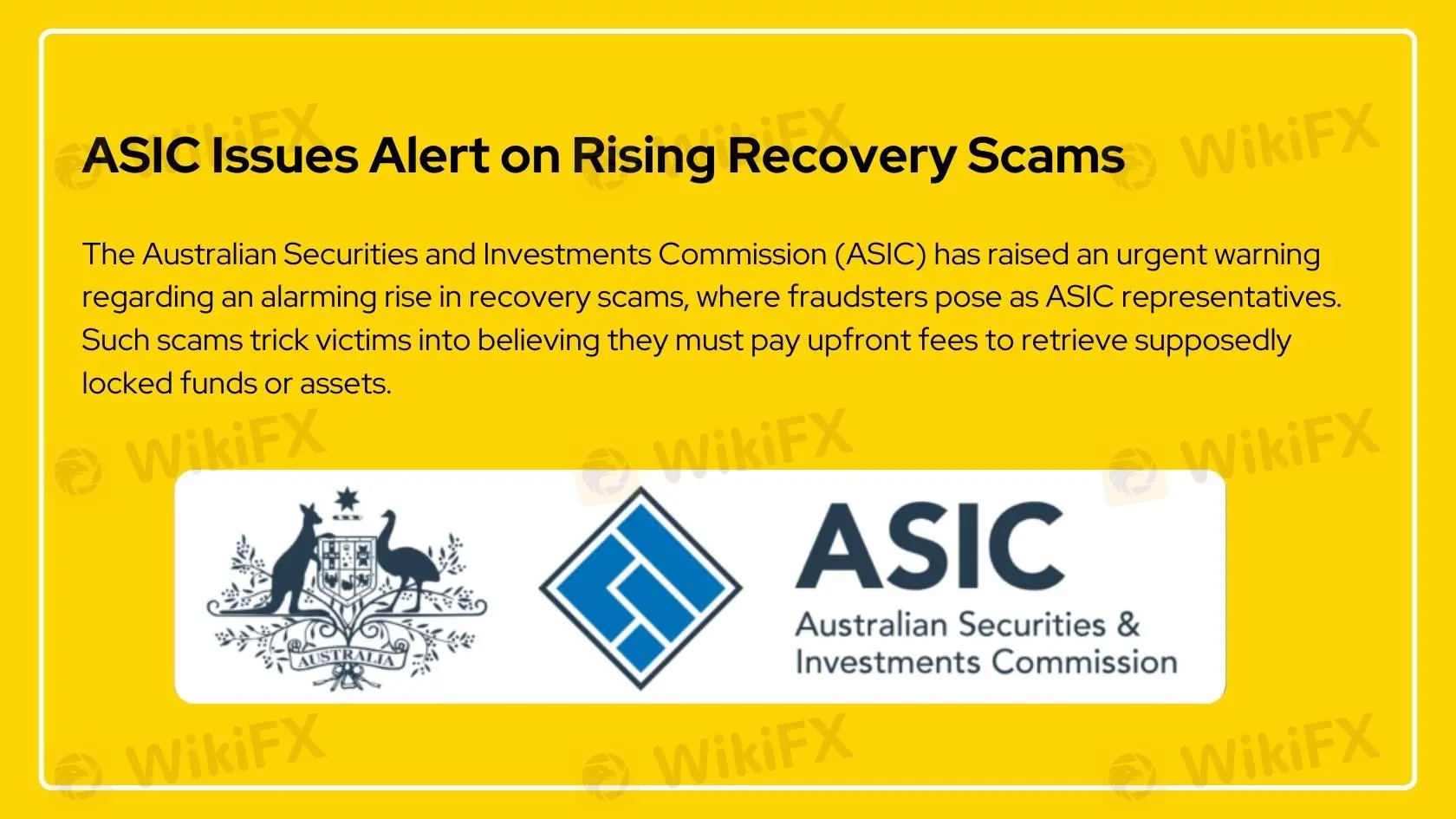简体中文
繁體中文
English
Pусский
日本語
ภาษาไทย
Tiếng Việt
Bahasa Indonesia
Español
हिन्दी
Filippiiniläinen
Français
Deutsch
Português
Türkçe
한국어
العربية
ASIC Issues Alert on Rising Recovery Scams
Abstract:The Australian Securities and Investments Commission (ASIC) has raised an urgent warning regarding an alarming rise in recovery scams, where fraudsters pose as ASIC representatives. Such scams trick victims into believing they must pay upfront fees to retrieve supposedly locked funds or assets.

Fraudulent Impersonation of ASIC
Scammers typically initiate contact via email, text messages, or phone calls, pretending to be from ASIC. In recent cases, scammers have specifically requested payments in US dollars to purportedly enable the release of investor funds. ASIC strongly clarifies it never charges fees for releasing assets or funds under any circumstances.
Recovery scams are particularly harmful because they target individuals already impacted by previous scams, exploiting their desperation to recover lost funds. ASIC emphasizes that investors should remain skeptical of anyone promising fund recovery in exchange for fees.
Recognizing and Avoiding Recovery Scams
ASIC emphasizes several key points to help investors spot these scams:
• No Payments Required: ASIC never demands payment in any currency—traditional or digital—including cryptocurrencies or stablecoins, to release locked funds or assets.
• Verifying Legitimacy: All official ASIC communications originate exclusively from email addresses ending in “@asic.gov.au”, and phone calls will only come from Australian numbers (country code +61).
• Unauthorized Use of ASIC Logo: Third-party entities are prohibited from using ASICs logo or claiming endorsement of services.
How to Respond if Contacted by Scammers
If you receive unsolicited communications claiming to be from ASIC:
• Immediately terminate the call or stop replying to emails or texts.
• Independently verify the contact by calling ASICs official number .
• Report suspicious activities to ASIC and Scamwatch.
Disclaimer:
The views in this article only represent the author's personal views, and do not constitute investment advice on this platform. This platform does not guarantee the accuracy, completeness and timeliness of the information in the article, and will not be liable for any loss caused by the use of or reliance on the information in the article.
Read more

Receiving Guaranteed Forex Return Promises? BEWARE, It's a SCAM!
Discover how fraudsters have duped investors with guaranteed forex return schemes in this guide. Read, stay alert and informed before investing.

Investors Lose Millions as Dubai-based Gulf First Commercial Brokers Vanishes
Oh! Another forex scam news has emerged, hitting millions worldwide, including Indian investors. The culprit - Gulf First Commercial Brokers, a UAE-based brokerage firm.

Millions Have Been Lost Due to the Forex Scam! Hope You are Not a Victim!
The black money trail from illegal forex trading activities is deepening its roots across India. Let's find out some latest forex scam stories.

Should You Trade with an 800 Crore Scam-ridden OctaFX?
The Enforcement Directorate accused, OctaFX, a forex trading platform, of an INR 800 crore scam through its investigation. But are ED's claims true? Let's find out!
WikiFX Broker
Latest News
Know the history of "Bank of India" before Investing — then Trade Confidently
Gold Prices Waver as Fundamentals Remain in Tug-of-War
FCA Warning List is Out: Check if Your Broker is on the List
Trading via Unauthorized Brokers? A Penalty of Up to INR 2 Lakh Awaits You!
AMarkets is an Unregulated Broker | You Must Know the Risks
How to Choose the Right VPS for Forex Trading
Markets4you Launches Global Giveaway to Celebrate 18th Anniversary
Still Falling for BotBro’s 60% Annual Forex Returns? Wake Up Before It Gets Too Late!
Webull Adds Crypto Trading Through Kalshi Partnership
Investment Scam Exposed: Deepfake Videos of Top Indian Leaders & Tech Icons misused to Lure Investor
Currency Calculator


